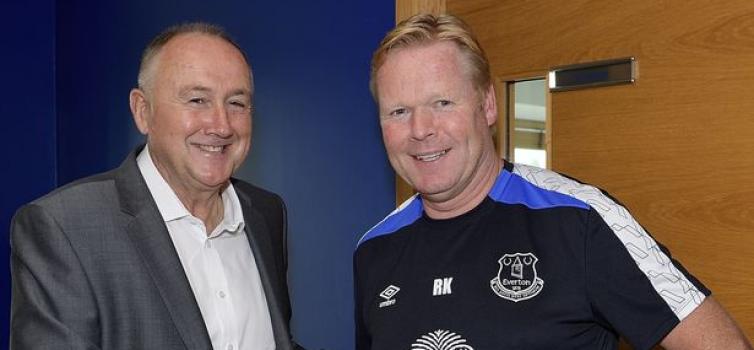Cascarino: Manager is most over-rated role in football

Steve Walsh (left) had ultimate responsibility for Everton's recruitment
Written by Simon Austin — October 25, 2017
TONY CASCARINO says managers have become football’s most over-rated personnel.
The former Republic of Ireland striker argues that we overestimate the influence a modern manager has. When a team is performing badly, the spotlight inevitably falls on the boss, as we saw with Ronald Koeman this week.
After all, they're the ones picking the team, standing on the touchline and facing the media. But Cascarino says there are many who are at least as significant behind the scenes.
“They [managers] are not the most important people at football clubs,” Cascarino told TalkSport.
“From analysts to scouts to tacticians to physios - they are all just as important. The biggest impact a manager has is on the style of play. You can’t have one single person responsible for a football club any more. You won’t see the likes of Alex Ferguson again, who was all of Manchester United.”
By common consent, the reason Everton have been a shadow of last season's side is that recruitment over the summer hasn't worked out.
Romelu Lukaku, who had scored 25 goals for the second consecutive season, was sold, along with Gareth Barry. Ten players were brought in and, on the whole, haven't impressed. (Whether it's wise to bring in 10 players in one window is questionable, but that's for another day).
Koeman was the man who got the bullet - but how much responsibility did he actually have for those transfers?
Undoubtedly a lot, but the man who was ultimately responsible was Director of Football Steve Walsh, who arrived from Leicester in July 2016.
“If you look at Everton, it clearly fell down on recruitment," Cascarino said. "What was brought in didn’t work out and that clearly played an important part in Ronald Koeman losing his job.
"It’s easy to get rid of a manager. Why do clubs do it? Because it’s the easy option and, relatively speaking, it’s cheap. Apart from the obvious candidates, the very best, it’s just a merry-go-round.”
On the flip side, Claudio Ranieri got the plaudits when Leicester won the Premier League in 2015/16, even though it was Walsh who had brought in Jamie Vardy, Riyad Mahrez and N’Golo Kanté.
“Look at Ranieri,” Cascarino added. “Every bit of recruitment was done before he got the job and he won the league."
There are two main reasons that modern managers - at the top level at least - don't have the influence they once did.
The first is the emergence of the Sporting Director (or Director of Football, or Head of Football Operations) who, like Walsh, oversees the football side of a club, from Academy to recruitment to sports science.
Owners are increasingly keen on this role because they want someone to take a strategic overview, whereas managers, by the very nature of their jobs, take short-term decisions based around winning the next game.
With a Sporting Director in place, the manager will be primarily concerned with preparing the team from match to match (although they will of course liaise with, and have an input on, factors such as sports science and recruitment).
This brings us onto the second reason why the modern manager isn't as important as many would believe: the sheer size of football operations at top clubs.
As Arsene Wenger pointed out in the summer, the manager of the future might be better coming from a business rather than a football background. As our backroom profiles show, there's a wide breadth of specialist expertise at Premier League clubs, from analysts to sport scientists to nutritionists to psychologists.
A good manager will have an understanding of these areas and, hopefully, a decent relationship with the practitioners, but he will inevitably have to delegate responsibility to them. And if changes are needed within these departments, they'll be made by the Sporting Director rather than the manager.
But still we focus on the gaffer. And he’s inevitably the one who gets the boot when things go wrong, as Koeman found out to his cost this week.



-1.png)





